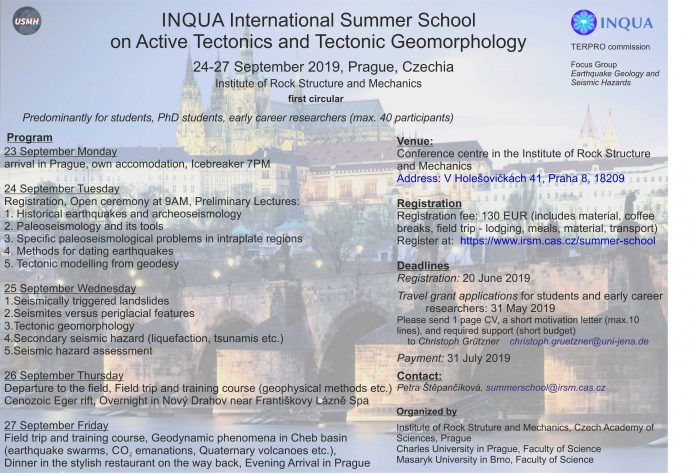This is a pretty cool job opportunity in one of the world’s most interesting places. Topics include: (1) developing techniques for processing historical aerial photographs into digital elevation data; (2) analysis of pre- and post-earthquake data for the purpose of assessing fault geometries, connectivity and kinematics; (3) modelling multi-fault ruptures using geologic and remotely sensed validation datasets, and exploring the implications of this research for seismic hazard analysis.
https://findajob.agu.org/job/8009710/phd-scholarship-at-the-university-of-canterbury-new-zealand/
-
PhD Opportunity in Active Tectonics and Remote Sensing, University of Canterbury, New Zealand
2019-06-06 | in Jobs -
New papers on paleoseismology, earthquakes, and active tectonics (June 2019)
-
Registration now open for the INQUA Int’l Summer School on Tectonics & Tectonic Geomorphology, 24-27 Sep, 2019, Prague
Register here for the INQUA International Summer School on Tectonics and Tectonic
Geomorphology, 24-27 Sep 2019, Prague:https://www.irsm.cas.cz/summer-school/
ECR & DCR travel grants are also available! Note that no accommodation will be organised in Prague, but one night is included during the field trip.
-
New papers on paleoseismology, earthquakes, and active tectonics (May 2019)
-
The 17th International Symposium on Geo-disaster Reduction
2019-04-25 | in EventsStill looking for a cool conference to attend this summer? Why not travel to Kyrgyzstan for the 17th International Symposium on Geo-disaster Reduction from 19-23 August 2019, organized by our friend Hans-Balder Havenith with Liège University, the Kyrgyz Institute of Seismology and Institute of Geomechanics and Mining, and the International Consortium on Geo-disaster Reduction (ICGdR)? more
-
Open positions in tectonics and related fields
-
1st circular: INQUA Int’l Summer School on Active Tectonics & Tectonic Geomorphology in Prague, 24-27 September 2019
The INQUA Focus Group on Earthquake Geology and Seismic Hazards (EGSHaz) will run the International Summer School on Active Tectonics and Tectonic Geomorphology in Prague from 24-27 September, 2019. This event replaces the PATA Days this year and aims mainly at MSc./PhD students and Early Career Researchers. Please note that this is not a classical PATA Days event where new science will be shown and discussed. The summer school is organized by the Institute of Rock Structure and Mechanics, Czech Academy of Sciences and the Charles University in Prague, Faculty of Science. Please find a pdf of the first circular here.

-
Christoph Grützner
New papers on paleoseismology, earthquakes, and active tectonics (April 2019)
-
Deadlines for the IAS Rome Congress – session on the sedimentary record of earthquakes, tsunamis and other extreme/catastrophic events
2019-03-26 | in MeetingThe deadline for the submission of abstracts to the 34th IAS Congress of Rome 2019 is approaching (30 March 2019). The 34th IAS meeting will be held in Rome from 10-13th September 2019 (http://iasroma2019.org/).
There will be lots of interesting sessions, of special interest for the earthquake geology community will be session 7.11 The Sedimentary Record of Earthquakes, Tsunamis and other Extreme/Catastrophic Events.
Conveners:
- Massimo Moretti (University of Bari Aldo Moro, Italy)
- Jasper Knight (Wits University, South Africa)
- Giuseppe Mastronuzzi (University of Bari Aldo Moro, Italy)
- Andreas Vött (Mainz University, Germany)
-
New papers on paleoseismology, earthquakes, and active tectonics (March 2019)
